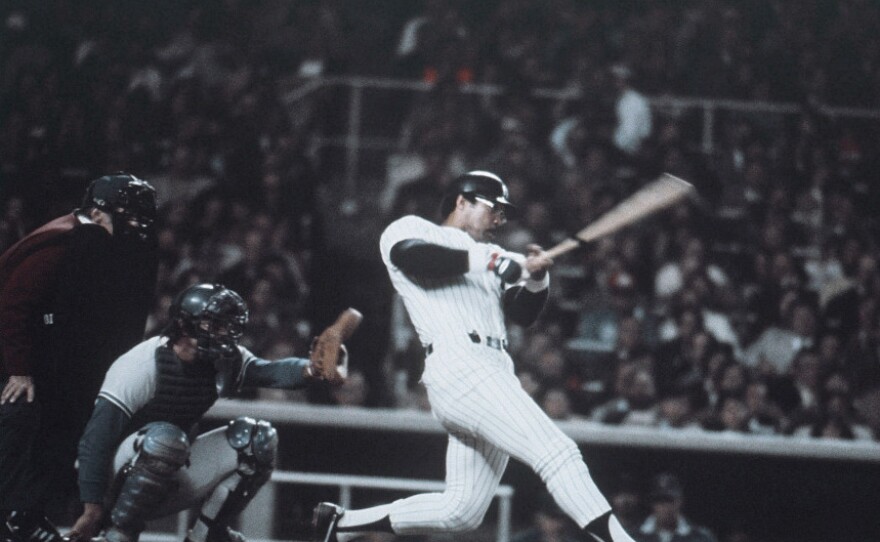Just last week, Pennsylvania, political scientist Terry Madonna was chatting with NPR political reporter Don Gonyea when he mentioned a piece of time-honored American lore: People don't pay attention to the election until after the World Series is over.
If you follow politics, you've heard some version of that line many times. And it's always had a ring of truth. Many American voters habitually put off thinking about voting until they have to. Any distraction will do, and the "the fall classic" is a lovely, mythic distraction.
This year, however, will be different from all others. Those putting off their voting decision until after the World Series of 2010 may miss the election of 2010 altogether. That's because for the first time, the November election may be over before the Series ends.
How did it come to this? And is there anything constitutional government can do to correct such a travesty?
Good questions. Let's take them one at a time.
First, the Constitution sets federal elections on the first Tuesday after the first Monday in November. The Constitution is silent on the dates for the World Series, which did not come along until more than a century later. But in 1903, when the champion of the National League and that of the American League began to meet after the regular baseball season, the series began on October 1.
Since then, the Series has been a fixture of October -- as much a part of the month as Columbus Day or Halloween.
When the divisional playoff system was introduced in 1969, it necessitated an extra week or so to determine the league champions. When the divisions expanded and another round of playoffs was added in 1995, it took another week. Game One of the Series got pushed past mid-October.
We have grown accustomed to seeing a seven-game series last nearly to the end of the month. That was especially true if some of the games were called for rain -- or even snow, as happened in 1979 in Baltimore.
Besides forcing players onto frozen turf in weather more suitable for football, this phenomenon has tended to truncate the time period in which baseball fans can turn their attention back to politics.
Still, the games and the campaigns went on. The Republic survived.
Now, however, the season has crept further into the fall than ever, threatening the balance between the national pastime and the nation's business. After 2006, extra days were added to the divisional playoff schedule. And in 2009, Major League Baseball decreed that Game One of the Series would not be played until Oct. 28, the latest start ever. No surprise: the 2009 series lasted into November.
This year, three games of the Series are slated for the 11th month. And for the first time this hyper-extended post-season play will coincide with a November election. And a collision is almost inevitable, because the Series begins Oct. 27 and Election Day comes at its earliest possible point on the calendar: Nov. 2.
Right now, Games Six and Seven of the Series are scheduled to be played after Nov. 2. Of course, those last two games may not be necessary. But what if they are? It may not be a constitutional crisis, but it does seem a hazard to the natural order of things. Can anyone imagine calling Reggie Jackson "Mr. November"? It makes him sound like a centerfold.
So what can we do about it?
Let's remember that all this is happening for the same reasons most big changes happen in baseball: television and money. The average per game viewing audience for the World Series peaked at 44.3 million in 1978 (the Jackson-led Yankees defeated the Dodgers in six). That was good for a 32.8 rating and a 56 share for the broadcasters. And the last game was played on Oct. 16.
But 30 years later, the Series drew just 13.6 million viewers, having wilted to a rating of 8.4 and a 19 share. Struggling to reverse the long decline, Commissioner Bud Selig and the club owners have tried to avoid Friday nights and minimize Saturday nights in the October schedule, now rapidly becoming the October-November schedule.
The MLB overlords have talked about avoiding November games by moving up the start of the season, but there are climatic, psychic and fiscal issues with a March version of Opening Day, too.
In the end, something has to give. And it's worth noting that Major League Baseball operates its player-control system under a special dispensation. Congress long ago granted MLB an exemption from the usual application of anti-trust laws. This was done for the perceived good of the game, or at least the well-lobbied best interests of the clubs' owners.
Wouldn't it be nice for baseball to return the concern by leaving baseball fans at least a week or so to pay attention to the contests that determine who will be in Congress?
Copyright 2022 NPR. To see more, visit https://www.npr.org. 9(MDAzMjM2NDYzMDEyMzc1Njk5NjAxNzY3OQ001))







